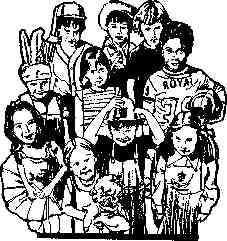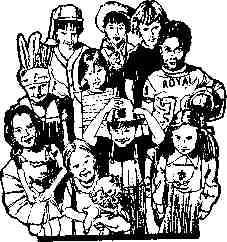
By PAM BRUZAN A graduate of Syracuse University in New York and a free-lance writer, she was formerly a reporter for the Illinois State Register, Springfield.
The rights of children SOMEBODY CARES a whole lot about the welfare and rights of Illinois' children — the Illinois Commission on Children. In fact, some point out that this commission is considered one of the best in the country. But there is no magic behind these superlatives; just a pragmatic and humanistic philosophy and work, which provides the basis for legislative proposals, public policies and services affecting minors. Naomi Hiett, who resigned as executive director August 31, after nearly 25 years with the commission, feels strongly that "kids aren't precluded from some rights because they're of a different age group." One of the commission's functions is to "make recommendations on needed legislative action on behalf of children." In order to do that the Committee on Rights of Minors was set up. Since it first met in December 1974 to review and analyze the existing statutes concerned with the rights of minors, one of its recommendations was enacted by the 79th General Assembly, one is being considered for adoption on the federal level and several other recommendations led to ten bills in the 80th General Assembly. Of the ten bills introduced to the 80th General Assembly, three failed to pass; two bills were tabled and two others are waiting to be studied by the House Judiciary I Committee. But many of the committee's proposals have not been introduced as legislation. Proposals would give minors rights in divorce, rights to seek medical services, confidentiality of records and more
Legislative proposals Two bills that deal with this problem, H.B. 388 and 389, sponsored by Rep. Giddy Dyer (R., Hinsdale), are still on the interim study calendar of the House Judiciary I Committee. The Emancipation of Minors Act, H.B. 389, would provide a procedure for legal emancipation of minors older than 16 but younger than 18. Under the bill, a petition requesting emancipation may be filed in circuit court (by a parent, guardian or any adult.). After a hearing the minor may be declared either totally or partially emancipated. Companion to the Emancipation of Minors Act is H.B. 388 which would amend the Juvenile Court Act by providing that a minor can be declared emancipated during a juvenile court proceeding. This would affect wards of the court, minors found in need of supervision or neglected minors. Hiett didn't anticipate that a large number of minors would claim emancipation if the legislation were enacted and she denied that this measure would break up families. "I'm strongly against anything that breaks up families," she said. When a minor wants emancipation, according to Hiett, the family situation has already deteriorated to the point where he or she may leave anyway. Hiett believes the emancipation proposal would help youngsters "who already are estranged from their families."
Children and
divorce
18 / January 1978 / Illinois Issues either party, the child of either party or the court may make the child an intervening party in the divorce proceedings. An attorney for the child would be appointed by the court. The bill was tabled in the House Judiciary I Committee.
Right to care The Committee on the Rights of Minors also recommended certain minors should have the right to give consent for their own health care procedures. Members of the committee felt unmarried minor mothers who care for their children should be able to give consent for medical or surgical procedures for themselves the same as when they were pregnant. In addition, the committee felt a minor who under other statutes may consent to venereal disease testing should also be able to consent to a test for pregnancy or cancer. In response to these recommendations, Rep. Holewinski introduced H.B. 308. This bill, which failed to pass in the House, proposed several amendments to a current law on medical consent. The bill also sought to alleviate the problem that can arise when children are left in the care of someone other than parents or legal guardians: Who can give consent for medical care if it's needed? According to the committee's report, "in the past, the physicians, schools, social and health agencies accepted consent from these 'practical' guardians in good faith." However, because of frequent litigation following such consents, the committee recommended that any adult individual other than a legal guardian who has responsibility for a minor longer than 90 days has the legal right to give consent to medical or surgical procedures undertaken by licensed physicians or dentists. The committee, recognizing "that a court decision or an order declaring a specific right does not carry with it the wherewithal to provide that resource," made several recommendations to make sure that minors can receive the care to which they are legally entitled. The proposed amendment to the Act Creating the Illinois Department of Children and Family Services (DCFS) passed as S.B. 301, sponsored by Sen. John E. Grotberg (R., St. Charles). The amendment, to be effective July 1, 1978, requires the department to develop individual programs itself, or to purchase such services for children whose needs do not fit an existing DCFS ward program or who will not be accepted by other facilities. Asked whether such a requirement would create a burden on existing departments, Hiett said, "I don't really have very much patience with [that line of thought]." She pointed out that various state agencies were created to provide services, and she thinks that when existing resources of such an agency are not suitable, agencies should have the authority to organize new programs without additional legislation. Hiett mentioned teenage alcoholism as an example of a blossoming problem with few programs available to combat it. "This is a mandate that [governmental agencies] don't just ignore developing trends, " she said. Although a child's right to legal counsel during hearings was established in the 1965 Juvenile Court Act, the provision is frequently abused or ignored. For instance, the county's public defender may be busy with adult cases. Or, in the case of a juvenile who admits to a delinquent act, the matter gets settled with input of expert opinions instead of a lawyer representing the interest of the juvenile. The committee's recommendations on that problem led to S.B. 357 and 358, sponsored by Sen. Dawn Clark Netsch (D., Chicago). The bills, which passed and became effective October 1, 1977, amend the Juvenile Court Act to "reinforce" the present working of the act. The amendments mandate appointment of a public defender or other counsel, prohibit the start of most hearings unless the minor is represented by counsel and make it mandatory for the public defender to be the attorney, without fee, when appointed by the court.
Confidentiality needs Confidentiality of minors' criminal files also needed improvement, according to the committee report. Of particular concern were situations when minors are arrested but subsequently not convicted. Under the present system a minor's file cannot be purged of the information on these contacts or arrests. Acting on the committee's recommendations, Rep. Woods Bowman (D., Chicago) and Rep. Willer cosponsored H.B. 1907. The bill, tabled after its first reading, would have amended the Delinquency Prevention Commission Act and the Juvenile Court Act. The identity of a minor was to be deleted from information of police contacts if that information were shared with other agencies or persons. If a minor were identified, information was to be limited to offenses for which the juvenile was found delinquent. On written request, police records would have been open to inspection by the minor, guardian or attorney in order to determine or challenge their accuracy. Following the conclusion of a court matter, the court would have had the authority to destroy all law enforcement records relating to the specific case. And all law enforcement records (including those not leading to conviction) about a minor were to have been destroyed when that person reached 19.
Child abuse law January 1978 /Illinois Issues/ 19  glected Child Reporting Act and the Juvenile Court Act.
glected Child Reporting Act and the Juvenile Court Act.
Previously, a physician could not retain a child suspected of suffering abuse. The child was treated, only to be returned home to suffer further abuse. Now, a physician who suspects that a child has been abused or neglected may retain that child under "temporary protective custody" in a hospital or other medical facility, while the Department of Children and Family Services undertakes an investigation. A guardian may be appointed for a child "if the petition for which the minor is before the court resulted from a report made pursuant to the Abused and Neglected Child Reporting Act." The book-length report of the committee contains many other recommendations that have so far not been introduced in the legislature. The following is a summary of those recommendations. In addition to the recommendation that led to passage of S.B. 301, the committee also proposed anamend-ment to the state's Welfare and Rehabilitation Services Planning Act affecting all agencies reporting to the legislature under the act. The amendment would require state agencies to explain to the legislature any court actions affecting their services or projects, such as changes of existing plans or new programs. Right to treatment But with the committee's recommended amendment to the Juvenile Court Act, a child could be made a ward of the court simply because it would be in the child's best interest. There does not have to be "fault, neglect or lack of concern by his parents, guardian or custodian." This provision does not include cases where finances alone are the problem.
Care without court Hiett described a hypothetical situation where the mother of a family receiving Aid to Families with Dependent Children (AFDC) assistance enters a hospital. If she has a handicapped child, it might be in the child's best interest to be placed temporarily in a foster home. But the federal government will not pay for aid to foster dependent children unless they have been made wards of the court. Illinois law also prohibits making children wards of the court when finances, such as the AFDC, are involved. "When you have responsible parents, you don't want to do anything to undermine their sense of responsibility," said Hiett. Requiring a court hearing or temporary court custody could result either in damage to the parent-child relationship or deprivation of needed services for the child. Since this recommendation involved federal programs, it was addressed to the National Council of Organizations on Children. The council has included the concept in its congressional recommendations.
School exclusion The committee recommended a new Illinois School Exclusion Procedures Act which minutely details an exclusion process. Grounds for exclusion are specified and hearing procedures are delineated. Appeals following such hearings may be made to the state superintendent of education. Hiett noted that appeals now are directed to the courts. She said the committee considered it more appropriate for appeals to be made to an educational agency. If students are involved in what Hiett termed "an absolute crisis" situation, an emergency suspension would be authorized.
Confidentiality of hearings
Confidentiality in appeal When Naomi Hiett resigned she assured the Commission on Children that despite the improvements that have been made, much remains to be done, Donna Gleespen, who became the new executive director on September 8, has assessed the commission's challenges and commitments: "The Commission's committees will be focusing on legislative proposals to improve the juvenile justice system and proposals to meet the needs of emotionally disturbed children and adolescents. It will continue to follow up on past recommendations made by its Committee on the Rights of Minors and it will also continue to be interested in the recommendations of past committees of the Commission.
20/ January 1978/ Illinois Issues
|
||||||||||||||||
